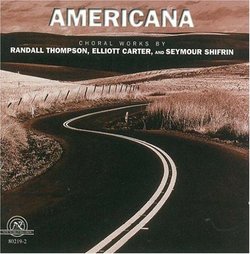| All Artists: Randall Thompson, Elliott Carter, Seymour Shifrin, Thomas Hilbish, Members of the University of Michigan Symphony Orchestra Title: Thompson: Americana/Carter: To Music/Shifrin: The Odes of Shang Members Wishing: 1 Total Copies: 0 Label: New World Records Release Date: 7/9/1996 Genres: Folk, Classical Style: Opera & Classical Vocal Number of Discs: 1 SwapaCD Credits: 1 UPC: 093228021926 |
Search - Randall Thompson, Elliott Carter, Seymour Shifrin :: Thompson: Americana/Carter: To Music/Shifrin: The Odes of Shang
 | Randall Thompson, Elliott Carter, Seymour Shifrin Thompson: Americana/Carter: To Music/Shifrin: The Odes of Shang Genres: Folk, Classical
|
Larger Image |
CD Details |
CD ReviewsBuy for the Shifrin and Carter Personne | Rocky Mountain West | 11/05/2009 (4 out of 5 stars) "I don't know the release date of this CD, but I'm pretty sure it's been around awhile. This is a well-performed CD that covers three pieces roughly grouped into the category of 'Americana'--whatever that's supposed to mean.
Randall Thompson, while less-frequently performed these days, was long a darling of choral directors around the country. The writing is considerate of tessitura, aware of balance, and goes together quickly with a minimum of fuss. I know. I've sung some it myself. The only thing that's missing is musical interest. The texts are strong, drawing from varied aspects of American life including the temperance movement. These are the sort of texts that Kurt Weill would have a field day with. But Thompson's music just doesn't go anywhere. It's inoffensive to a fault, as if extra rehearsals were always to be avoided. The 1930s, when this was written, were musically adventurous times. It appears that Thompson missed the memo. The Elliott Carter piece "To Music" is set to a poem by Robert Herrick, the best of the cavalier poets. It is a soaring acapella piece with a strong musical impulse (and also some nice solo passage work). This is a very early Carter piece (1930s) and bears little resemblance to his later music, other than obvious musicality and competence. The music is tonal, but adventurously so. The performance is spot-on and satisfying. There are a great many good composers from the middle of the last century who are known only to connoisseurs. These might include Fine, Wolpe and others. Seymour Shifrin was one of the best of the bunch. Always musical, he was also bold and broad in scope. "Odes of Shang" from the early 1960s is a beautiful example. It is a setting of two Confucian poems (translated by Ezra Pound) for mixed choir, piano and percussion. The first movement is assertive and motoric, celebrating youth and vitality. The second is more thoughtful, viewing life from the other end. The vocal and ensemble challenges are large--the piano has a broader agenda than just giving the singers their notes--and the payoff is equal to the demand. In some ways, the choral writing reminds me of Sessions' writing in "Lilacs". All performances are by the University of Michigan choir and members of the University orchestra, conducted by Thomas Hibish. The singing is confidant, rock-solid in pitch, and focused on the music. This is a CD worth having." |

 Track Listings (8) - Disc #1
Track Listings (8) - Disc #1